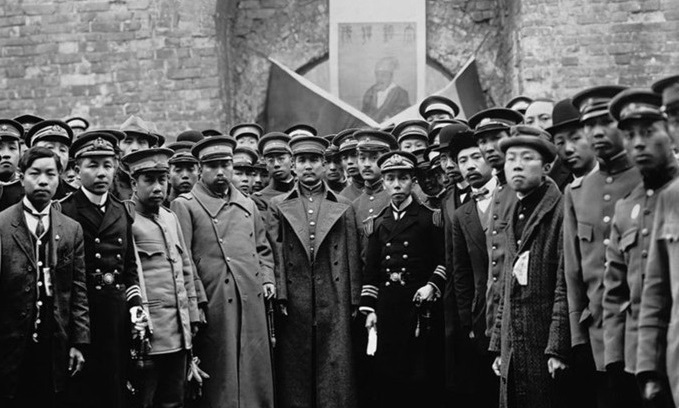Turn 8 Crisis: A Party With A State.
nachtingale
20. On that "honk, mimimi" type beat everyday.
- Location
- Malaysia
- Pronouns
- He/They
In Defense of Republicanism.

"What is the freedom of the Individual, when compared to that of the State?"
- Sun Yat-Sen.
"The trouble of this democracy that Lanzhou seeks to practice, is that it forgets the reactionary interests of the current ruling class. It spurns the revolutionary goal in favor of the serving of their own economic interests, their lands, their factories, their merchant houses. They call us despoilers, yet it is they who despoil the goal of our government, of our party, and of our revolution, that is the independence and unification of the Chinese peoples from all tyrannies, the tyrannies of the foreigner, the tyrannies of capital, and the tyrannies of feudal-monarchism!"
- Colonel Jiang Jieshi.
Democracy withers on the vine.
The collapse of confidence from the Republic's executive and military branches in the ability of the legislature to govern had been a fall from favor long in the making, with the continuous hindrance of decisive policymaking by the indecisive and incoherent parliamentarians growing larger and larger cracks beneath the Chinese Nationalist Party (KMT). The greater dissatisfaction in the midst of the fallout of the southern liberations, though celebrated by a great many, was merely the final straw in a long line of critiques launched against the petty democracy of the revolutionary government.
By the time of the President's memorandum, it had become entirely clear to the legislature which way the wind was blowing on this matter. Most especially, the fact that the President had the backing of a greater portion of the NRA would make resistance to his personal mandate hard to come about, with only a handful of Party officials backing oppositional voices to the measure in any significant manner.
Some would even see this as a positive, pointing towards the fact that the critiques aimed at the legislative branch of the Party were not wholly unfounded, and that perhaps the end of the political tutelage had come far too early, that the Party needed to be reformed into its role as the steward of the revolutionary state.
In an overwhelming vote of approval, a nod towards the extreme popularity the President still enjoyed even after nearly a decade at the helm of the revolutionary project, the measure to suspend legislative democracy by the KMT would be passed in its entirety. The announcement of the passage of the amendment to Republic rule would be accompanied by a great mass of NRA troops moving to ensure that chaos did not grip the Republic by local dissidents.
Within the Party itself, the passage was taken with equal amounts fear, worry, but most of all, hope for a stabilization of Lanzhou governance. That hope seemed to have been vindicated, as many of the expected opponents to the measure, especially the Republican Party and the multitude of autonomous provincial governors, chose wisely not to revolt in the face of overwhelming NRA dominance of their localities, and the lack of their own strength to oppose the Lanzhou government.
The previous agreement for Governor Feng and Governor Liu's factions to be allowed to integrate themselves into the KMT Party would lead to them be surprisingly supportive of the Party-State, their positions solidified by the move. Furthermore, some of the more moderate Republicans would meekly rejoin the KMT in the hopes of carving back out their position as a conservative faction in the Party, but their influence would be far smaller as a result of their former betrayal.
Unsurprisingly, however, those most vocal in their opposition to the mandate would come from the GMD government to the south and the radical Communist factions in the Republic, though it would be the GMD government to the south that would pose the most significant threat, as almost immediately their forces would declare independence from the Republic. GMD militias would work to secure the twin provinces of Guangdong and Guangxi, purging them of the most apparent KMT machines that had only begun to be setup, forcing what few dedicated Party members in the south to go to ground.
These matters would raise the question of whether the Republic should push for a war against the GMD government, given their relative inexperience and confederal nature. The growth of a third national government in contention for Chinese unification could be a dangerous prospect, though NBIS notes that the disorganized nature of the southern system may cause them to look inwards for a longer time period. An invasion would also demand yet another front that the NRA would have to focus on, though this time with the support of southern allies such as Yunnan and Governor Liu.
The collapse of confidence from the Republic's executive and military branches in the ability of the legislature to govern had been a fall from favor long in the making, with the continuous hindrance of decisive policymaking by the indecisive and incoherent parliamentarians growing larger and larger cracks beneath the Chinese Nationalist Party (KMT). The greater dissatisfaction in the midst of the fallout of the southern liberations, though celebrated by a great many, was merely the final straw in a long line of critiques launched against the petty democracy of the revolutionary government.
By the time of the President's memorandum, it had become entirely clear to the legislature which way the wind was blowing on this matter. Most especially, the fact that the President had the backing of a greater portion of the NRA would make resistance to his personal mandate hard to come about, with only a handful of Party officials backing oppositional voices to the measure in any significant manner.
Some would even see this as a positive, pointing towards the fact that the critiques aimed at the legislative branch of the Party were not wholly unfounded, and that perhaps the end of the political tutelage had come far too early, that the Party needed to be reformed into its role as the steward of the revolutionary state.
In an overwhelming vote of approval, a nod towards the extreme popularity the President still enjoyed even after nearly a decade at the helm of the revolutionary project, the measure to suspend legislative democracy by the KMT would be passed in its entirety. The announcement of the passage of the amendment to Republic rule would be accompanied by a great mass of NRA troops moving to ensure that chaos did not grip the Republic by local dissidents.
Within the Party itself, the passage was taken with equal amounts fear, worry, but most of all, hope for a stabilization of Lanzhou governance. That hope seemed to have been vindicated, as many of the expected opponents to the measure, especially the Republican Party and the multitude of autonomous provincial governors, chose wisely not to revolt in the face of overwhelming NRA dominance of their localities, and the lack of their own strength to oppose the Lanzhou government.
The previous agreement for Governor Feng and Governor Liu's factions to be allowed to integrate themselves into the KMT Party would lead to them be surprisingly supportive of the Party-State, their positions solidified by the move. Furthermore, some of the more moderate Republicans would meekly rejoin the KMT in the hopes of carving back out their position as a conservative faction in the Party, but their influence would be far smaller as a result of their former betrayal.
Unsurprisingly, however, those most vocal in their opposition to the mandate would come from the GMD government to the south and the radical Communist factions in the Republic, though it would be the GMD government to the south that would pose the most significant threat, as almost immediately their forces would declare independence from the Republic. GMD militias would work to secure the twin provinces of Guangdong and Guangxi, purging them of the most apparent KMT machines that had only begun to be setup, forcing what few dedicated Party members in the south to go to ground.
These matters would raise the question of whether the Republic should push for a war against the GMD government, given their relative inexperience and confederal nature. The growth of a third national government in contention for Chinese unification could be a dangerous prospect, though NBIS notes that the disorganized nature of the southern system may cause them to look inwards for a longer time period. An invasion would also demand yet another front that the NRA would have to focus on, though this time with the support of southern allies such as Yunnan and Governor Liu.

"In China, there is a shortage of talents of all kinds, especially within the Communist Party.
Because the Communist Party has only been established for a few years, there is even less talent."
On the other hand, the radical Communists were, in comparison, far less organized in comparison to the south, having relied mostly on their strength in the Hebei Soviets instead of properly forming fallbacks against a purge such as this. Attempts at an early uprising would be rapidly squashed by their more moderate cousins in the CCP, with assistance from the IRA and NRA respectively in forcing the radicals underground, and the expulsion of the most radical leftists from the All-China Trade Union Congress (ACTUC), thought the latter measure would be heavily kept at bay by the concern of splintering the trade unionist movement.
The question of the status of the CCP itself would be a matter of some contention however, having neither accepted nor rejected the passage of the Party-State as the governing policy of the Republic. Instead, they would approach the Party with an offer for the continued cooperation between Beijing and Lanzhou to continue without the need for the integration of the socialist movement directly into the KMT.
Naturally, however, the offer would be heavily scrutinized by the President and his allies in the Party, who would demand several measures be taken before such an offer could be accepted, chief amongst them the subordination of the ACTUC to the KMT as a party organization and the requirement of CCP to hold dual-membership cards in the KMT before they would be allowed to operate as a political organization.
Reluctantly, Beijing would accept Lanzhou's demands, greatly solidifying KMT dominance within the Republic and over the labor movement in the short term...
What is to be Done?
On the GMD Government.| [] [GMD] Agree to a Southern Expedition against Guangzhou. | [] [GMD] Leave them be, for now. | |
| Supported by President Sun and the NRA, Votes will count as 1.2 Votes. | Opposed by President Sun and the NRA, Votes will count as 0.8 Votes. |
For simplicity sake, the 596 member system will be maintained for this term of voting.
| KMT Factions | Members |
| Mainline | 178 Members |
| Revolutionary Group | 143 Members |
| Independents | 31 Members |
| Ma Clique | 54 Members |
| Governor Feng Yuxiang | 52 Members |
| Governor Liu Xiang | 31 Members |
| "Legal" Partners of the KMT | |
| Chinese Communist Party - Moderates | 84 Members |
| Chinese Communist Party - Radicals | 13 Members |
Pick ONE Faction.
[] KMT - Mainline[] KMT - Revolutionary Group
[] KMT - Independents
A/N: Member counts have been changed to account for the purges and restructuring of opposition parties. There is a 24 hour moratorium.
